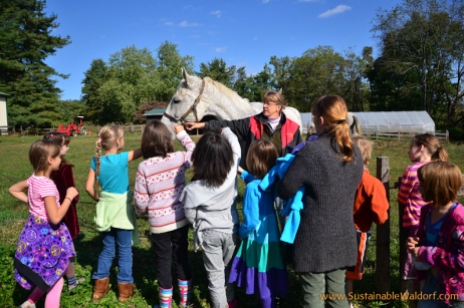“It’s all a matter of keeping my eyes open.”
-Annie Dillard
The morning dawns cloudy and brings with it that winter treasure, snow. There is no choice but to drop my long awaited lesson plans to take advantage of the freshly fallen snow. If my overarching goal is to ensure that this generation values the woods and the wonders of nature, there is no better guest educator than snow.

Gathering Freshly Fallen Snow

Found Ice Sculpture
As an Environmental Educator working in the woods, one learns to keep their eyes open and their plans flexible. I find that the most valuable moments in class often happen when I am least expecting it, and that’s when an ability to take advantage of the moment is crucial. I can’t get so focused on what I planned that I don’t see the forest for the trees, so to speak.

Deer Signs
I have to stay open to being interrupted by a mischievous dancing squirrel in the top of a tree. If the students interrupt me to watch him and exclaim, that’s a good thing. I remind myself that they are seeing. They are paying attention to the forest. And, in all honesty, in that moment it is even more important that they practice paying attention to the forest than if they pay attention to me. That is, afterall, why I’m leading this lesson in the first place. The long term hope of all these games and lessons combined is to invite students to slow down and simply be in the forest.
So, welcome, flock of geese. Welcome, dancing squirrel. Welcome, amazing ice formation.

We saw a whole world in the ice formation above. We happened upon it in the middle of the trail as we were walking along one day. It was well worth changing course for a few minutes to experience these ephemeral formations. The students were absolutely enthralled by them. Nature has so many hidden wonders, patiently waiting for us to take notice.


 Stay connected to what’s happening in our Ecoliteracy & Sustainability programs here, at
Stay connected to what’s happening in our Ecoliteracy & Sustainability programs here, at 







































